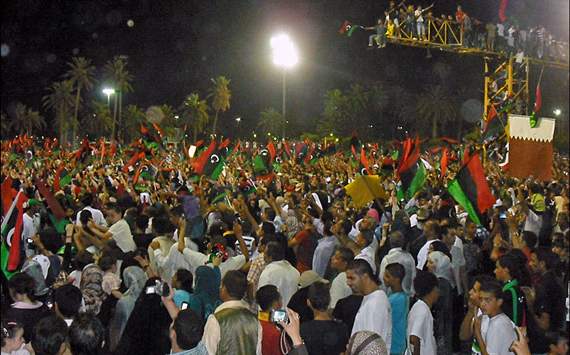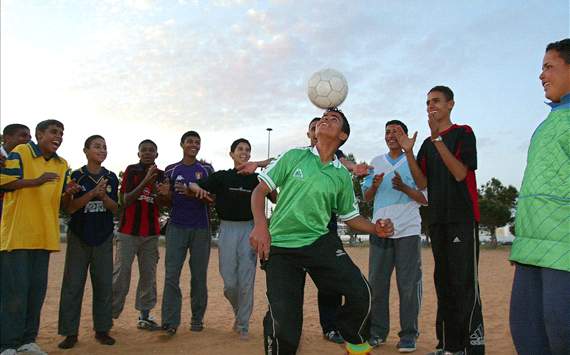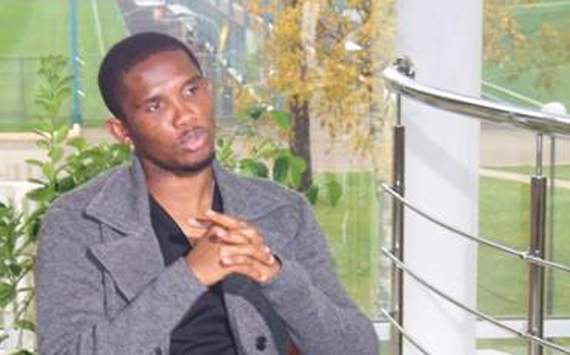Through death, defection & destruction - the true story of war-torn Libya's miraculous qualification for 2012 Africa Cup of Nations
This is the tale of how the Mediterranean Knights overcame huge adversity to secure their right to compete at the continental tournament for the first time since 2006

- Tripoli, September 3, 2011
COMMENT
Of all the remarkable stories in football this year, few come close to matching the extraordinary qualification of Libya to the 2012 Africa Cup of Nations (Afcon).
For a team that was almost torn apart by civil war - with their captain in exile due to his support of Colonel Gaddafi's regime, and a number of teammates defecting to fight militarily for the 'rebels' - Libya's presence at Equatorial Guinea and Gabon will be nothing short of miraculous.
So miraculous that the shock absence of regular Afcon challengers Egypt, Nigeria and Cameroon from the January finals pales into comparison when compared to Libya's participation.
When the February 17 uprising began in Benghazi, Libya were tied for second place in Group C alongside Mozambique, while Zambia occupied first place. Their next fixture was scheduled for March 28, but by that time the Nato bombing campaign targeting Muammar Gaddafi’s regime was well underway, and the Confederation for African Football (Caf) no longer considered Tripoli safe enough to host matches.
The game was moved to Bamako, Mali, where 20,000 locals cheered Marcos Paqueta’s side to a resounding 3-0 victory over Comoros, chanting “Gaddafi, Gaddafi!” after each goal and jubilantly raising posters of the now-deceased colonel. With full points secured, then-captain Tarik al Taib thanked the Malians profusely and audaciously claimed that, although team members from Benghazi weren’t able to participate, the "whole team is for Muammar Gaddafi".
The truth turned out to be far more complex, and events in the ensuing months provided tangible proof that Al Taib was mistaken in his hasty assessment. Libya’s civil war intensified, claiming thousands of lives with it, and footballers who had attempted to remain neutral began defecting to the opposition.
Two weeks after their 1-1 draw against Comoros in Mitsamiouli in early June, reports emerged that Juma Gtat, the country’s top goalkeeper, and three unnamed members of the national team had defected to the rebel-controlled town of Jadu in the Nafusa mountains. This was considered the first of many major propaganda blows to Gaddafi.
Al Taib reacted by calling the rebels “rats and dogs”, a comment which would later cement his on-going and likely permanent exile from the national team. On the other hand, players such as Walid Alkatrouchi, Ahmed Al Soughir, and others left their team’s training camp in Tunisia and began fighting on the western frontline.
The player decided to take up arms after visiting a childhood friend who had lost an arm in the fighting, and having also witnessed the horrible state of wounded rebels and civilians. Furthermore, Alkatrouchi detailed how fellow fighters managed to convince him that the best thing he could do for his country would be to help Libya qualify for the 2012 Afcon.
“You would never find me here playing football, but it was my colleagues and my friends on the line that told me ‘this is your future, you must go there. This is also like a war for you. This is a duty that you must do and go to play. After that you can come back,'” he added.
 Football in Tripoli | Libyans are pleased to have qualified for the 2012 Afcon
Football in Tripoli | Libyans are pleased to have qualified for the 2012 AfconTwo weeks after their 1-1 draw against Comoros in Mitsamiouli in early June, reports emerged that Juma Gtat, the country’s top goalkeeper, and three unnamed members of the national team had defected to the rebel-controlled town of Jadu in the Nafusa mountains. This was considered the first of many major propaganda blows to Gaddafi.
Al Taib reacted by calling the rebels “rats and dogs”, a comment which would later cement his on-going and likely permanent exile from the national team. On the other hand, players such as Walid Alkatrouchi, Ahmed Al Soughir, and others left their team’s training camp in Tunisia and began fighting on the western frontline.
The player decided to take up arms after visiting a childhood friend who had lost an arm in the fighting, and having also witnessed the horrible state of wounded rebels and civilians. Furthermore, Alkatrouchi detailed how fellow fighters managed to convince him that the best thing he could do for his country would be to help Libya qualify for the 2012 Afcon.
“You would never find me here playing football, but it was my colleagues and my friends on the line that told me ‘this is your future, you must go there. This is also like a war for you. This is a duty that you must do and go to play. After that you can come back,'” he added.
All the while, the Libyans were, amazingly, still on course to qualify for their first Afcon since 2006 despite a war raging both within the team and across the country. Tripoli fell to the opposition on August 21, imbuing the already important September 3 match against Mozambique with additional significance.
The game was held in Cairo, behind closed doors for security reasons, and the team wearing the red, green, black, and white colours of the pre-Gaddafi flag defeated the southern Africans 1-0 after observing their original national anthem. The victory prompted rapturous celebrations across much of the divided nation and set up a final showdown against Zambia in Chingola that would determine who would make it to Afcon 2012.
While they didn’t obtain the win they needed to automatically qualify, their 0-0 draw against the Chipolopolo on October 8 proved just enough for them to deservedly snatch a spot as one of the best second-place teams. The Libyans learned their fate when one of their coaches burst into the locker room after the game to reveal that Nigeria had conceded a late equaliser against Guinea, instilling a sense of euphoria and pride that the players won’t soon forget.
With that, a miserable chapter of Gaddafi-era football came closer to being resoundingly shut. An era in which players could only be referred to by their jersey numbers in the Libyan press so as not to compete for the national spotlight with the former leader.
In this same era, one of the colonel’s sons, Al Saadi, treated the Libyan Football Federation as a personal plaything and used his money and influence to represent the 'Greens' at international level on 18 occasions despite a readily apparent lack of talent and discipline.
Before Libyans can truly move on, mysteries of the past must be put to rest. Al Saadi, who fled to Niger in early September and is on Interpol’s 'most-wanted' list, is now under investigation for his potential involvement in the unsolved murder of former midfielder and coach Bachir Al Ryani.
While that and other atrocities require further scrutiny, Libyans are thankful that, come January, they will be represented at the 2012 Afcon. And this time, their freshly nicknamed 'Knights of the Mediterranean' will be able to dedicate their goals to their countless martyrs, instead of Gaddafi.
Samuel Eto’o: I joined Anzhi Makhachkala because their offer matched my talent & future of football is in Russia
The former Inter striker earns a reported £8.7 million a year and says he is inundated with phone calls from big-name players asking him about the league

CNN
The 30-year-old left Inter in the summer for a reported fee of €28 million (£24.3m) to move to Anzhi Makhachkala, having won the Champions League, Serie A and domestic cups during his two-year stint at San Siro, where he scored 53 goals in 102 appearances for the club, including 37 in 53 games in the 2010-11 season.
His wage at cash-rich Anzhi is said to be £8.7m a year, leading to accusations that he only moved to Russia for the money.
But in an interview with CNN, Eto’o said he is not bothered with what other people think and that he is worth the money.
“I don't care what people think. I think all of us want to work and get paid what we are worth. Anzhi made an offer, which was at the same level as my talent, and they are paying me what they think I am worth,” he said.
“To be honest a year ago I had no idea I would be here. The opportunity hadn't arisen. But when the offer came in, I thought about it and realised that it was the best one for myself, my career and my family so I went for it.
“He [the chairman, Suleiman Kerimov] told me he wanted to build a big team and he had thought about me as someone who could lead that project. It touched me in my heart because I had only seen myself as a professional player, not a project leader, and this new challenge was important to me.
“I was offered a great deal and we reached an arrangement quite quickly.”
Recent reports have linked a number of high-profile players such as Robin van Persie with moves to Anzhi, with Fabio Capello also supposedly a managerial target.
Eto’o himself has been linked with a loan move back to Inter, but he believes the future of football will be in Russia and that more big-name players will continue to move there over time, joining the likes of Roberto Carlos and Yuri Zhirkov, who have also joined Anzhi this year.
“I am happy that more players are thinking about coming. Many of them are important players and they have been linked with clubs here,” he said.
“That is a big victory for Anzhi and the club is giving an opportunity for Russian football to attract stars.
“I have to tell you that practically every day I get a message or a phone call from a high-profile player who wonders whether there are opportunities to come here because the truth is the future of football is in Russia.
“Furthermore, I believe that leading up to the World Cup here in 2018, the quality of the league will be better.”
Eto’o also had kind words for former manager Jose Mourinho, who managed the striker to Champions League glory two years ago as Inter secured the treble, before moving on to Real Madrid last summer.
“Jose Mourinho is one of the best managers with whom I have worked. I had a chance not only to have him as a coach but as a colleague, a friend, a big brother,” he said.
“I had a chance to learn from him and he was open to receiving advice from me as well even though I think he knew it all.”
On his time so far in Russia, Eto’o, who has scored four goals for his new club, said it was nice to have experienced a different place to live and that whilst the money was important, the experience of a new country would help him in the future on a personal level.
“No-one wants to work for little money; otherwise they would be living on the streets,” he added.
“What I would like to say is that I am lucky to have gone places where I can learn new things in life and that is the case here. This experience will add something to my life and that makes me a better person.”
Eq Guinea 'almost ready' for 2012
 The stadium in the Ecuato-Guinean capital Malabo is ready to host next year's finals, where it will stage one of the semi-finals in February
The stadium in the Ecuato-Guinean capital Malabo is ready to host next year's finals, where it will stage one of the semi-finals in February Venues for the 2012 Africa Cup of Nations in Equatorial Guinea are "almost ready", according to the local organising committee COCAN.
The Confederation of African Football (Caf) is inspecting facilities ahead of Saturday's tournament draw in Malabo.The Caf team has completed its visit to co-hosts Gabon and arrives in Malabo on Wednesday, having been to Bata on the Equatorial Guinea mainland beforehand.
"All the venues are almost ready," said Cocan spokesman David Monsuy.
Did you know?
Continue reading the main story- Equatorial Guinea's men have never contested an Africa Cup of Nations before but their women have appeared at a Fifa World Cup
"I cannot speak for [Caf] and say if they will be happy or not after their latest inspection but I can say that we try to meet their requests for organising the tournament," Monsuy told BBC Sport.
"They asked us to change the press area and the changing rooms, to make them larger, and as you can see, we are working on it. We hope that by December, everything will be ready."
A new stadium has been built in Bata, which will host the opening game of the tournament on 21 January.
The venue in Malabo will be the one which was built when Equatorial Guinea hosted the Women's Nations Cup in 2008, even though it only has a capacity of 15000 - some way short of Caf's usual minimum.
Monsuy admitted that work still had to be done to promote the Nations Cup within the country.
"For the moment you can't say that the population is really aware that a great sporting event is going to take place in the country," he said.
"We have to address that question, but after the draw [on Saturday] people will realise that the Cup of Nations is round the corner."
He said two promotional campaigns had been launched - one aimed at locals and the other aimed at an international audience.
Malabo and Bata are the two host cities in Equatorial Guinea while in Gabon, the tournament will take place in Franceville and Libreville - which will stage the final on 12 Fenruary.
See also
-
Michel makes Eq. Guinea return
25 October 11Football -
Gabon 'will be ready' for CAN 2012
24 October 11Football -
Caf unveils 2012 official mascot
17 September 11Football -
Kick-off times for qualifiers out
16 September 11Football -
Coach quits Nations Cup co-host
19 October 11Football -
Eq Guinea 'nearly ready' for CAN
14 August 11Football -
Eq Guinea set Nations Cup target
12 February 11Africa











No comments:
Post a Comment